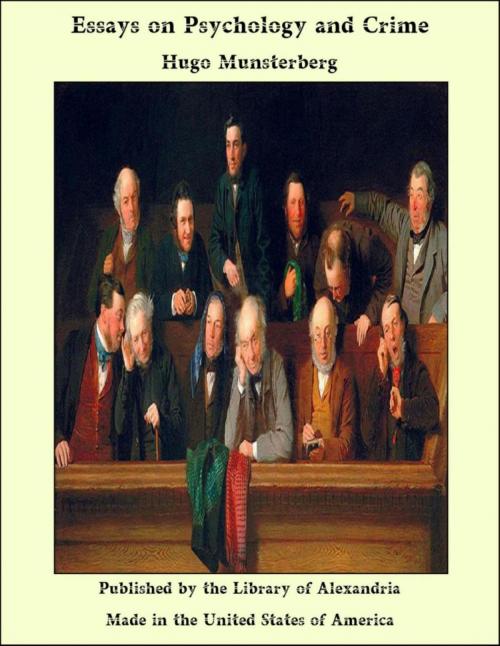Essays on Psychology and Crime
Nonfiction, Religion & Spirituality, New Age, History, Fiction & Literature| Author: | Hugo Munsterberg | ISBN: | 9781465583406 |
| Publisher: | Library of Alexandria | Publication: | March 8, 2015 |
| Imprint: | Language: | English |
| Author: | Hugo Munsterberg |
| ISBN: | 9781465583406 |
| Publisher: | Library of Alexandria |
| Publication: | March 8, 2015 |
| Imprint: | |
| Language: | English |
THE administration of justice is susceptible of division into two general branches: one having to do with the determination of the facts, the other, with the application to the determined facts of legal precepts. The facilities of administration in the jural held have reached a state of high development. In the class-room and the seminar, the attention of the student of law is concentrated upon mastery of legal principles as applied to determined facts; he is educated in legal bibliography and precedent. In practice, legal erudition earns signal commendation and oft-times lucrative reward. Legal principles have been formulated into rules, doctrines, and statutes, and have been harmonized and codified. The legal practitioner, therefore, usually approaches his task proficient in the knowledge of legal science. But there is the other branch of the administration of justice which is no less important than the jural. It has to do with the domain of facts which holds the dramatic episodes of every controversy between man and man or man and state. For the tasks here the lawyer is not usually well prepared. The ability to discern the facts which control the application of legal principles is not methodically developed. The education and training of a lawyer for eliciting the facts are more or less adventitious.
THE administration of justice is susceptible of division into two general branches: one having to do with the determination of the facts, the other, with the application to the determined facts of legal precepts. The facilities of administration in the jural held have reached a state of high development. In the class-room and the seminar, the attention of the student of law is concentrated upon mastery of legal principles as applied to determined facts; he is educated in legal bibliography and precedent. In practice, legal erudition earns signal commendation and oft-times lucrative reward. Legal principles have been formulated into rules, doctrines, and statutes, and have been harmonized and codified. The legal practitioner, therefore, usually approaches his task proficient in the knowledge of legal science. But there is the other branch of the administration of justice which is no less important than the jural. It has to do with the domain of facts which holds the dramatic episodes of every controversy between man and man or man and state. For the tasks here the lawyer is not usually well prepared. The ability to discern the facts which control the application of legal principles is not methodically developed. The education and training of a lawyer for eliciting the facts are more or less adventitious.















